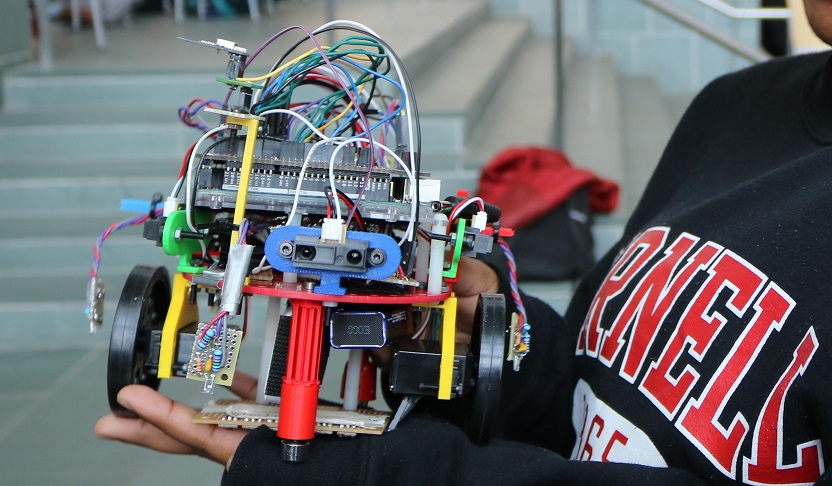ece3400-2018
This project is maintained by CEI-lab
ECE 3400 Intelligent Physical Systems
Course Description
Students will engage in a holistic design approach to Intelligent Physical Systems which can perceive, reason about, and act upon their environment. This course will expand on the ECE 2000-level courses, and include topics on algorithms, field programmable gate arrays, wireless communication, sensors, actuators, power, and mechanics. Students will learn the value and trade-offs between theory, simulation, and physical implementations, and gain familiarity with rapid prototyping techniques, system debugging, team work, leadership skills, time management, and how to disseminate work to a broader audience through webpages.
Specific outcomes include:
- The ability to apply specific design methodologies to the course project
- The ability to evaluate what problems are best solved in software, electronics, or mechanics; as well as the trade-offs between theory, simulation, and practical implementations.
- Efficient team work, as a member and as a leader.
- Effectively communication skills through online media.
- Awareness of professional and ethical responsibilities in the context of Intelligent Physical Systems. Prerequisites include ECE 2100 ECE 2200 and ECE 2300. Recommended prerequisite: ECE 2400 (or equivalent). All information is gathered on this page; no additional textbooks are required.
Semester Project
In teams of 4 you will design, fabricate, and program a robot able to autonomously explore a maze. Control will be based on an Arduino Uno; the default propulsion method will be differential drive with continuous rotation servos. The robot will traverse the maze by following black lines on a white floor; it must also be able to detect walls, an audible start signal, and treasures with different shapes and colors. When the robot has finished exploring the maze, it must transmit its progress to a base station (also based on Arduino Uno), and print the maze on a screen for verification. Points will be awarded for speed, accuracy, and innovative design methods. The entire robot can cost no more than $100; this chart shows how the price is calculated.
All designs must be documented throughout the semester on a group website. The goal is for these websites to be used as a source of reference for future classes. Accordingly, they will be graded with respect to thoroughness and clarity. Only documented accomplishments receive credits. However, to give teams a competitive advantage, we ask everyone to keep explicit code and circuit designs private until the end of the semester.
Team Composition
The teams will be composed by the TA’s and lecturer without exception.
Teams will be dependent on lab-time sign-up, student skillsets, and personalities.
All labs are divided into two sub-labs. To ensure a good mix, it is required that you keep switching partners for the different labs. Be sure to note what team members solve what on the website.
We will host internal team evaluations and practice constructive critiscism. Receiving and giving profesional feedback may be uncomfortable at first, but it is a skill that will help you in any future career.
This folder includes documents detailing how students will be graded. Be aware that a lot of changes occur every semester, and consequently the score-chart may be changed throughout the semester.
Tutorials and Helpful links
Check out this page for lots of tutorials and helpful links!
